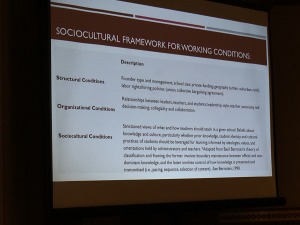As I mentioned earlier in the week, the 2018 annual meeting of the American Education Research Association is happening over the next few days. The fifth blog entry related to K-12 online learning session from AERA 2018 that I am posting is:
Public Educators Under Private Management: Black Teachers’ Experiences in Quasi-Markets of School Choice and Competition
In Growing and Sustaining Black Teachers: Examining the Intersection of Identity, Professional Development, and School Context
Sat, April 14, 10:35am to 12:05pm, New York Hilton Midtown, Second Floor, Sutton CenterAbstract – Positive school-working conditions—leadership/professional development, academic expectations, teacher relationships, and safety/order—have been found to significantly impact teacher turnover and student achievement (Kraft, Marinell, & Yee, 2016). Attention to working conditions is particularly important for maintaining a racially diverse teacher workforce, as research on the benefits of teacher diversity, including significant gains in academic outcomes for students of color (Dee, 2004; Egalite & Kisida, 2015; Grissom & Redding, 2016; Wright, 2015), are undermined by poor working conditions that lead to teacher turnover, particularly for teachers of color (ToCs; Ingersoll & May, 2011). In light of the salience of working conditions for ToCs, this paper draws attention to education reforms that have radically restructured organizational conditions in which many ToCs work, such as the creation of new schools operated by leaders from the private sector. In several cities across the country, district leaders have sought to dissolve centrally managed public schools, moving from a school system to a system of schools, such as a “portfolio model of management” (PMM) encompassing multiple providers with varying organizational practices (Bulkley, 2010). In PMMs, government contracts with private providers offer autonomy from district rules in exchange for accountability in hopes of fostering innovation and greater academic outcomes (Bulkley, 2010).
Research is unclear, however, about Black teachers’ sorting patterns and employment choices in a changing landscape of school governance. Critical analysts warn, moreover, that experimentation with PMMs has occurred primarily in cities serving sizeable populations of students of color and foster troubling patterns of disruption, such as “school closures, school takeovers/turnarounds, the expansion of charter schools/networks that serve as a replacement for democratically elected boards of education, and the wholesale firing of veteran teachers, most of whom are African American” (Anderson & Dixson, 2016, p. 366). Indeed a major consequence of educational restructuring has included the decline and displacement of Black teachers in large cities (Albert Shanker Institute, 2015; Anderson & Dixson, 2016; Buras, 2015); a noted paradox in light of prominent efforts to reduce racial parity gaps between students and teachers of color (White, 2016b). Nonetheless, as PMMs expand via marketization of public schools, novice and developing educators of color will increasingly choose—or feel “chosen” (see Mary Pattillo’s (2016) ethnography with parents in Chicago’s school choice program)—to work in privately managed public schools.
As such, this paper uses qualitative interviews with 25 Black teachers who work in autonomous/semi-autonomous public schools, including charter, innovation, pilot, and virtual schools. An iterative analysis of themes from interviews are used to understand Black teachers’ professional opportunities and choices, their experiences and relationships with leaders, whether/how autonomy is distributed in new educational contexts as a dimension of working conditions, as well as the role of race in shaping issues of power and control in teachers’ negotiations of classroom practices. A critical study of these issues is significant to enhance retention efforts of ToCs and to broaden discussions about the de/re/professionalization of teachers in market-driven public schools.
Author
Terrenda Corisa White, University of Colorado-Boulder
The reality of many jurisdictions in the United States is that we have moved from a school system to a system of schools. The main purpose of this study was to explore how are black teachers being sorted or displaced in a competitive education market. Essentially, does school choice water down efforts to diversify the teaching workforce.
The specific research questions for this study were:

Click on the image to view a larger version.
The sociocultural framework through which this research was viewed was described as:

Click on the image to view a larger version.
The participants in this study included:

Click on the image to view a larger version.
Interestingly, the average teacher turnover rate over the previous three years of public schools in the neighborhood was 19%. The turnover rate at Brighton was 60%, which she characterized as structural changes because they were leaving the charter school that was managed by an educational management organization to some other setting.
The findings that were reported included:

Click on the image to view a larger version.
Interestingly, while the abstract indicated that “this paper uses qualitative interviews with 25 Black teachers who work in autonomous/semi-autonomous public schools, including charter, innovation, pilot, and virtual schools;” there was no data focused on virtual schools presented as a part of the study.
The session was included as part of a panel, that was described as:
Growing and Sustaining Black Teachers: Examining the Intersection of Identity, Professional Development, and School Context
Sat, April 14, 10:35am to 12:05pm, New York Hilton Midtown, Second Floor, Sutton Center
Session Type: Symposium
Abstract
Given the body of research indicating the positive impact Black teachers have on students, there is a need for scholarship highlighting the complex nature of their teaching and learning experiences. Thus, this symposium aims to achieve the following objectives: (a) utilize historical inquiry to explore the Black teacher construct through metaphor and consider implications for addressing their varied and layered professional experiences; (b) examine how Black teachers, at the intersection of various identity markers, confront and overcome systemic challenges in urban school settings; (c) explore professional development supports tailored to, and differentiated based on, Black teachers’ developmental experiences as novice, mid-career, and veteran teachers; and (d) examine how Black teachers experience and navigate a quasi-market of school choice and competition.
These papers form a special issue that will be published in The Urban Review.
I did ask Terrenda following her session, as she had mentioned at the beginning that she had collected data from four schools, but was just presenting on three of them for this session. The fourth was not a virtual school. While her IRB allows her to collect data from virtual and cyber programs, she has not been able to recruit one yet.






 12 Unique Blogs Are Written By Professors
12 Unique Blogs Are Written By Professors
Leave a comment